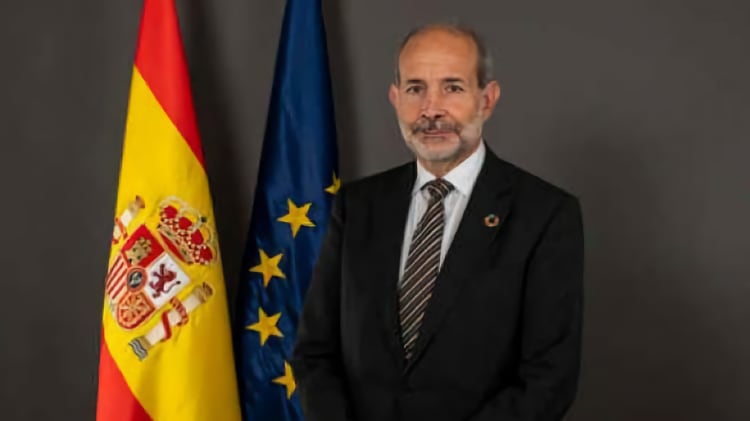Luis Ayllón
The Russian Government communicated yesterday to the Spanish Ambassador in Moscow, Marcos Gómez, the expulsion order of 27 members of the Spanish diplomatic representation in the Russian Federation, who have been given seven days to leave the country.
The measure has been adopted in reciprocity for the expulsion of 27 members of the Russian Embassy in Madrid on April 5, which the Spanish authorities justified on the grounds that they represented a threat to the “security” interests of Spain. The Spanish Government joined the decision taken by most European countries, which expelled Russian diplomats as a reaction to the invasion of Ukraine ordered by President Vladimir Putin.
The Ministry of Foreign Affairs of the Russian Federation conveyed to the Spanish ambassador a “firm protest” against the measure taken by Spain, and informed him that a total of 27 people from the Spanish Embassy had seven days to leave Russian territory.
Although the Spanish Foreign Ministry has not provided details on those affected by the expulsion, The Diplomat has learned from reliable sources that of the 27 expelled, 15 have diplomatic passports and 12 have service passports.
Among those expelled are neither the ambassador, nor the ‘number two’ of the Embassy, Agustín Núñez; nor the consuls in Moscow; Mabel Vicandi; and in St. Petersburg, Félix Valdés.
Until now, Spain had a total of 26 people with diplomatic passports in Russia, of which 10 were career diplomats, and the rest were counselors of different departments (Interior, Trade, Tourism, Agriculture, Information, Defense, etc).
A total of 15 of these diplomats or advisors appear in the list of those expelled, in an operation in which the Russian authorities have tried to match those expelled by Spain. Thus, for example, the Spanish Government neither expelled the ambassador, nor the ‘number two’, nor the consul general in Barcelona, a post considered very important by Russia, due to the large number of Russians living in Catalonia.
The staff with diplomatic passports of the Russian Embassy in Madrid is much larger than the one Spain has in Moscow, and thus, among those expelled by the Spanish authorities there were 22 with diplomatic passports and only five with service passports.
The personnel with service passports, the most affected
Precisely, the expulsion of the dozen Spaniards with service passports is the one that poses the most problems because among them are secretaries, heads of service, etc., who deal with the day-to-day running of the diplomatic representation, and most of whom are people hired when they were already living in Russia and who have made their lives there, normally with Russian families. For them, it is a real drama, as they are forced to leave the country and are separated from their spouses and children, who cannot follow them because of their jobs or school situation.
In this exchange of expulsions, Spain seems to be more affected than Russia, since it has fewer personnel than the Russians, who had fifty diplomats in our country, and the workers have very different characteristics.
Spain will also be more adversely affected in the functioning of its Embassy than other large European countries, such as Germany, France or Italy, whose personnel in Russia is much larger than that of Spain and which lose less than half. The Russian Government informed France of the expulsion of 34 diplomats and Italy of 24.
Moreover, it should be borne in mind that the Embassy in Moscow handles Spain’s relations with Uzbekistan, Turkmenistan, Belarus and Armenia, although a diplomatic antenna was recently created for the latter country, which will allow for a diplomat to be stationed in Yerevan.
The decision of the Russian authorities has been contested by the Spanish Ministry of Foreign Affairs, which, through a communiqué issued yesterday, rejected the expulsion, understanding that reciprocity is not justified, because those affected have not infringed the Vienna Convention regulating diplomatic relations.
The communiqué stresses that when Spain decided last April 5 to order the expulsion of 27 Russian diplomats “it was based on duly justified security reasons, which are not present in this case”.
In announcing the decision then, Albares said that it was because the Russian diplomats represented “a threat to the security interests” of Spain, as well as because of the “terrible actions” that Russian forces were committing at that time in Ukraine, among others in the town of Bucha.
The Foreign Ministry also states in its communiqué that the work of the Spanish Embassy staff, “whose professionalism this Ministry wishes to highlight, has always fully respected the obligations provided for in the Vienna Convention on Diplomatic Relations and the Vienna Convention on Consular Relations”.
In a recent parliamentary response the Spanish Government had indicated that it was “aware” of the possibility of the expulsion of diplomatic personnel and assured that it was prepared “for such an eventuality, in addition to keeping in close contact and coordination with its European partners”. In fact, after the expulsion of the Russian Embassy staff, Foreign Ministry spokeswoman Maria Zakharova already warned that “all decisions of this kind will have a corresponding response”.
Russia has already decided to close the Latvian, Estonian and Lithuanian consulates in the cities of St. Petersburg and Pskov. And so far, in addition to Spain, countries such as Austria, Bulgaria, Croatia, Denmark, Estonia, Finland, France, Germany, Greece, Ireland, Italy, Luxembourg, Norway, Montenegro, the Netherlands, Poland, Portugal, Romania, Slovenia, Sweden, Japan, the United States and Spain have been affected by the expulsions.






